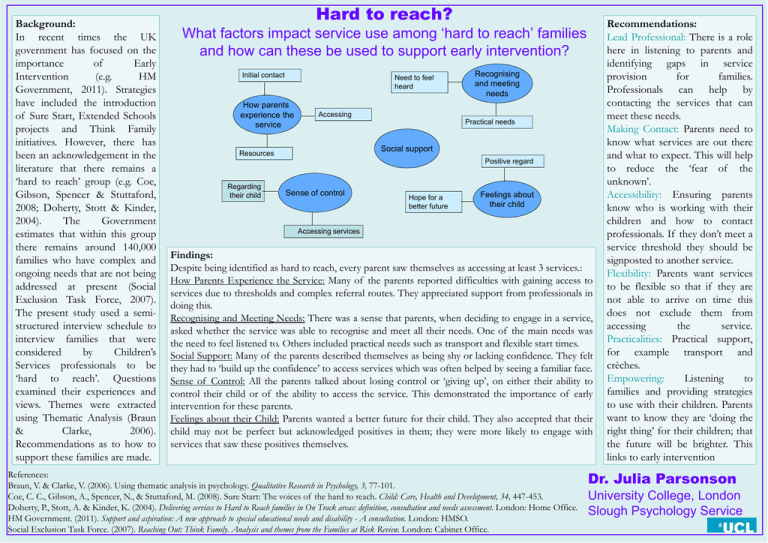Hard to reach?
advertisement

Background: In recent times the UK government has focused on the importance of Early Intervention (e.g. HM Government, 2011). Strategies have included the introduction of Sure Start, Extended Schools projects and Think Family initiatives. However, there has been an acknowledgement in the literature that there remains a ‘hard to reach’ group (e.g. Coe, Gibson, Spencer & Stuttaford, 2008; Doherty, Stott & Kinder, 2004). The Government estimates that within this group there remains around 140,000 families who have complex and ongoing needs that are not being addressed at present (Social Exclusion Task Force, 2007). The present study used a semistructured interview schedule to interview families that were considered by Children’s Services professionals to be ‘hard to reach’. Questions examined their experiences and views. Themes were extracted using Thematic Analysis (Braun & Clarke, 2006). Recommendations as to how to support these families are made. Hard to reach? What factors impact service use among ‘hard to reach’ families and how can these be used to support early intervention? Initial contact Need to feel heard How parents experience the service Recognising and meeting needs Accessing Practical needs Social support Resources Positive regard Regarding their child Sense of control Hope for a better future Feelings about their child Accessing services Findings: Despite being identified as hard to reach, every parent saw themselves as accessing at least 3 services.: How Parents Experience the Service: Many of the parents reported difficulties with gaining access to services due to thresholds and complex referral routes. They appreciated support from professionals in doing this. Recognising and Meeting Needs: There was a sense that parents, when deciding to engage in a service, asked whether the service was able to recognise and meet all their needs. One of the main needs was the need to feel listened to. Others included practical needs such as transport and flexible start times. Social Support: Many of the parents described themselves as being shy or lacking confidence. They felt they had to ‘build up the confidence’ to access services which was often helped by seeing a familiar face. Sense of Control: All the parents talked about losing control or ‘giving up’, on either their ability to control their child or of the ability to access the service. This demonstrated the importance of early intervention for these parents. Feelings about their Child: Parents wanted a better future for their child. They also accepted that their child may not be perfect but acknowledged positives in them; they were more likely to engage with services that saw these positives themselves. References: Braun, V. & Clarke, V. (2006). Using thematic analysis in psychology. Qualitative Research in Psychology, 3, 77-101. Coe, C. C., Gibson, A., Spencer, N., & Stuttaford, M. (2008). Sure Start: The voices of the hard to reach. Child: Care, Health and Development, 34, 447-453. Doherty, P., Stott, A. & Kinder, K. (2004). Delivering services to Hard to Reach families in On Track areas: definition, consultation and needs assessment. London: Home Office. HM Government. (2011). Support and aspiration: A new approach to special educational needs and disability - A consultation. London: HMSO. Social Exclusion Task Force. (2007). Reaching Out: Think Family. Analysis and themes from the Families at Risk Review. London: Cabinet Office. Recommendations: Lead Professional: There is a role here in listening to parents and identifying gaps in service provision for families. Professionals can help by contacting the services that can meet these needs. Making Contact: Parents need to know what services are out there and what to expect. This will help to reduce the ‘fear of the unknown’. Accessibility: Ensuring parents know who is working with their children and how to contact professionals. If they don’t meet a service threshold they should be signposted to another service. Flexibility: Parents want services to be flexible so that if they are not able to arrive on time this does not exclude them from accessing the service. Practicalities: Practical support, for example transport and crèches. Empowering: Listening to families and providing strategies to use with their children. Parents want to know they are ‘doing the right thing’ for their children; that the future will be brighter. This links to early intervention Dr. Julia Parsonson University College, London Slough Psychology Service



